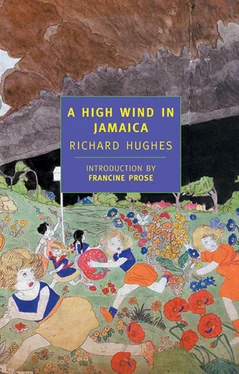Unlike William Golding’s far more simplistic The Lord of the Flies , to which it is sometimes compared, Richard Hughes’s novel resists any attempts to extract from it a moral or sociological lesson, a bit of received wisdom or home truth. It’s hard, in fact, to think of another fiction so blithe in its refusal to throw us the tiniest crumb of solace or consolation, to present a single character who functions as a lodestar of rectitude or beneficence. In the end, everything in this luminous, extraordinary novel is so much the reverse of what we think it should be, or what we would expect, that we are left entirely disoriented — unsure of what anything is, or should be. The effect is disturbing and yet beautiful, fantastic but also frighteningly true to life. Published in 1929, just as history was preparing events that would forever revise the terms in which one could talk about innocence and evil, A High Wind in Jamaica is one of those prescient works of art that seems somehow to have caught (on the breeze, as it were) a warning scent of danger and blood — that is to say, of the future.
— FRANCINE PROSE
I
One of the fruits of Emancipation in the West Indian islands is the number of the ruins, either attached to the houses that remain or within a stone’s throw of them: ruined slaves’ quarters, ruined sugar-grinding houses, ruined boiling houses; often ruined mansions that were too expensive to maintain. Earthquake, fire, rain, and deadlier vegetation, did their work quickly.ᅠ
One scene is very clear in my mind, in Jamaica. There was a vast stone-built house called Derby Hill (where the Parkers lived). It had been the center of a very prosperous plantation. With Emancipation, like many others, that went bung . The sugar buildings fell down. Bush smothered the cane and guinea-grass. The field negroes left their cottages in a body, to be somewhere less disturbed by even the possibility of work. Then the house negroes’quarters burned down, and the three remaining faithful servants occupied the mansion. The two heiresses of all this, the Miss Parkers, grew old; and were by education incapable. And the scene is this: coming to Derby Hill on some business or other, and wading waist-deep in bushes up to the front door, now lashed permanently open by a rank plant. The jalousies of the house had been all torn down, and then supplanted as darkeners, by powerful vines: and out of this crumbling half-vegetable gloom an old negress peered, wrapped in filthy brocade. The two old Miss Parkers lived in bed, for the negroes had taken away all their clothes: they were nearly starved. Drinking water was brought, in two cracked Worcester cups and three coconut shells on a silver salver. Presently one of the heiresses persuaded her tyrants to lend her an old print dress, and came and pottered about in the mess halfheartedly: tried to wipe the old blood and feathers of slaughtered chickens from a gilt and marble table: tried to talk sensibly: tried to wind an ormolu clock: and then gave it up and mooned away back to bed. Not long after this, I believe, they were both starved altogether to death. Or, if that were hardly possible in so prolific a country, perhaps given ground glass — rumor varied. At any rate, they died.
That is the sort of scene which makes a deep impression on the mind; far deeper than the ordinary, less ro-mantic, everyday thing which shows the real state of an island in the statistical sense. Of course, even in the transition period one only found melodrama like this in rare patches. More truly typical was Ferndale, for instance, an estate about fifteen miles away from Derby Hill. Only the overseer’s house here remained: the Big House had altogether collapsed and been smothered over. It consisted of a ground floor of stone, given over to goats and the children, and a first floor of wood, the inhabited part, reached from outside by a double flight of wooden steps. When the earthquakes came the upper part only slid about a little, and could be jacked back into position with big levers. The roof was of shingles: after very dry weather it leaked like a sieve, and the first few days of the rainy season would be spent in a perpetual general-post of beds and other furniture to escape the drips, until the wood swelled.ᅠ
The people who lived there at the time I have in mind were the Bas-Thorntons: not natives of the Island,“Creoles,” but a family from England. Mr. Bas-Thornton had a business of some kind in St. Anne’s, and used to ride there every day on a mule. He had such long legs that his stunted mount made him look rather ridiculous: and being quite as temperamental as a mule himself, a quarrel between the two was generally worth watching.ᅠ
Close to the dwelling were the ruined grinding and boiling houses. These two are never quite cheek by jowl: the grinding house is set on higher ground, with a waterwheel to turn the immense iron vertical rollers. From these the cane juice runs down a wedge-shaped trough to the boiling house, where a negro stands and rinses a little lime-wash into it with a grass brush to make it granulate. Then it is emptied into big copper vats, over furnaces burning faggots and “trash,” or squeezed-out cane. There a few negroes stand, skimming the poppling vats with long-handled copper ladles, while their friends sit round, eating sugar or chewing trash, in a mist of hot vapor. What they skim off oozes across the floor with an admixture of a good deal of filth — insects, even rats, and whatever sticks to negroes’ feet — into another basin, thence to be distilled into rum.
This, at any rate, is how it used to be done. I know nothing of modern methods — or if there are any, never having visited the island since 1860, which is a long time ago now.
But long before that year all this was over at Ferndale: the big copper vats were overturned, and up in the grindinghouse the three great rollers lay about loose. No water reached it: the stream had gone about its own business elsewhere. The Bas-Thornton children used to crawl into the cut-well through the vent, among dead leaves and the wreck of the wheel. There, one day, they found a wildcat’s nest, with the mother away. The kittens were tiny, and Emily tried to carry them home in her pinafore; but they bit and scratched so fiercely, right through her thin frock, that she was very glad — except for pride — that they all escaped but one. This one, Tom, grew up: though he was never really tamed. Later he begat several litters on an old tame cat they had, Kitty Cranbrook; and the only survivor of this progeny, Tabby, became rather a famous cat in his way. (But Tom soon took to the jungle altogether.) Tabby was faithful, and a good swimmer, which he would do for pleasure, sculling around the bathingpool behind the children, giving an occasional yowl of excitement. Also, he had mortal sport with snakes: would wait for a rattler or a black-snake like a mere mouse: drop on it from a tree or somewhere, and fight it to death. Once he got bitten, and they all wept bitterly, expecting to see a spectacular death-agony; but he just went off into the bush and probably ate something, for he came back in a few days quite cock-a-hoop and as ready to eat snakes as ever.ᅠ
Red-headed John’s room was full of rats: he used to catch them in big gins, and then let them go for Tabby to dispatch. Once the cat was so impatient he seized trap and all and caterwauled off into the night banging it on the stones and sending up showers of sparks. Again he returned in a few days, very sleek and pleased: but John never saw his trap again. Another plague of his were the bats, which also infested his room in hundreds.ᅠMr. Bas-Thornton could crack a stockwhip, and used to kill a bat on the wing with it most neatly. But the din this made in that little box of a room at midnight was infernal: earsplitting cracks, and the air already full of the tiny penetrating squeaks of the vermin.
Читать дальше












